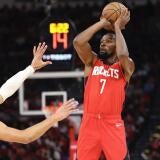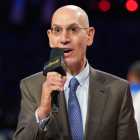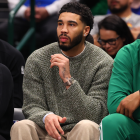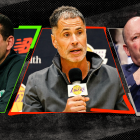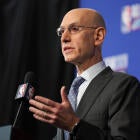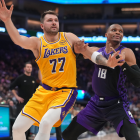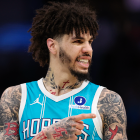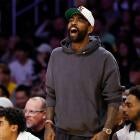
Ranking five biggest moves Bob Myers made in building of Warriors' dynasty
It all started with the drafting of Draymond Green, but that's not No. 1 on the list
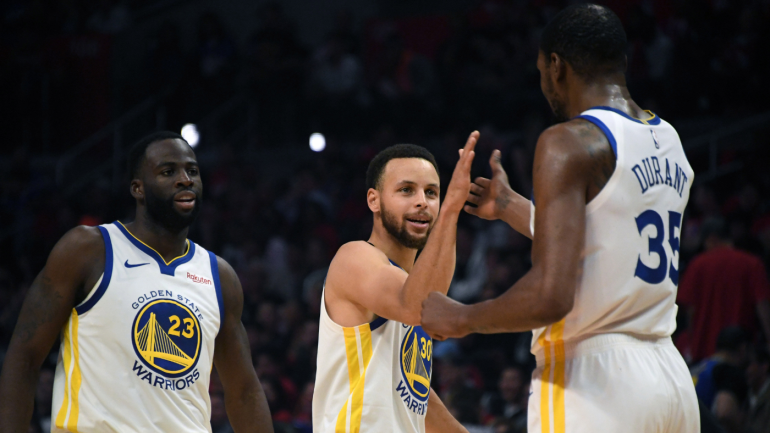
Last month, Bob Myers announced that he was stepping down from his role as the Golden State Warriors' president and general manager, thus ending one of the most successful runs any NBA front office executive has enjoyed.
On Friday, the Warriors announced that Mike Dunleavy Jr., who had served under Myers as executive vice president of basketball operations, will step up into the GM role, with Kirk Lacob, son of owner Joe Lacob, also assuming more decision-making responsibility.
It makes for the perfect time to look back at Myers' run with Golden State. As such, below is a ranking of the five biggest moves that Myers made in the building of a dynasty.
1. Hiring Steve Kerr
This was not easy decision. Stephen Curry, the franchise's emerging superstar, was vocally supportive of Mark Jackson, who had led the Warriors to consecutive postseasons, including a 2013 first-round upset over the third-seeded Denver Nuggets, and a 51-win season. For an organization that had spent a large part of the previous four decades as a punchline, that kind of success had to be taken seriously.
Had Jackson not been such a divisive locker-room figure while alienating pretty much the entire front office, perhaps his fate as coach would've been different. That said, one didn't need to look too far under the hood to recognize that the Warriors, relative not to their historical standard but rather their current personnel and potential, were underperforming on the court under Jackson as well.
After a seven-game loss to the Clippers in the 2014 playoffs, Myers made the move to replace Jackson with Steve Kerr, who, the very next season without almost the exact same roster, took the Warriors from 51 to 67 win en route to winning the franchise's first championship in four decades.
Over the course of NBA history, there aren't many examples, if any at all, of a coach, armed with mostly the same players as his predecessor, making this kind of immediate quantifiable difference. There's a plausible picture to be painted that the Warriors, for all their talent, never would've won a title under Jackson. They've won four under Kerr. It was the single-most important decision Myers made for the franchise.
2. Drafting Draymond Green
After being promoted to general manager in April of 2012, Myers hit a home run in his first draft out of the gate by selecting Harrison Barnes at No. 7 overall and Green -- probably the greatest second-round pick in NBA history until Nikola Jokic came along -- at No. 35.
Barnes became an integral starter during his time with Golden State, while Green became a pillar of the dynasty as arguably the best defensive player of a generation and the perfect pilot for Kerr's player-and-ball-movement system.
Overall, Myers' draft ledger was hit-and-miss with the Warriors. In addition to Green and Barnes, Myers landed Kevon Looney in 2015 as the last pick of the first round, which is a pick that seems to pay more dividends every season as Looney has become an increasingly integral, and at times indispensable, big man in Golden State's collectively diminutive lineups. After that, things get more gray.
It remains to be seen what Jonathan Kuminga and/or Moses Moody become. They could be starters on future versions of the Warriors, or they could be trade chips. Both have shown potential. They're far from busts, but they've yet to pay off in any real way. Jordan Poole was a great pick at No. 28 overall in 2019, although the $140 million contract that Myers gave Poole last summer could end up looking equally bad.
Jacob Evans was never a player and is out of the league. We'll see about Patrick Baldwin Jr. Taking James Wiseman at No. 2 overall in what has turned out to be a deep 2020 class was a disaster. Myers should've traded Wiseman long before he did. By waiting, Wiseman lost all value on the market as Myers attempted to walk too fine a two-timeline line.
All of this said, the drafting of Draymond alone outweighs every other decision on this list. It was the kind of pick that defines a dynasty, and Myers nailed it in his first draft.
3. Curry's $44M extension
Though Curry had shown plenty of potential over his first three years in the league, his defective right ankle was legitimately threatening to derail, if not ultimately end, his career. Curry missed the last 40 games of the 2011-12 season after spraining that right ankle numerous times. He had surgery two straight summers, and when it came time for his rookie extension, the $44 million offer the Warriors made over four years reflected the risk that those surgeries would only prove to be the first of many in what would become, as Curry has described it, a pseudo-Grant Hill story.
"In any deal, there is an appropriate amount of fear right?" Myers told The Athletic in 2017. "Should we do this? Should we not? Should we do more? Should we do less? I've been on both sides. Sometimes there is a little discomfort. That's OK. But then something needs to push you past that point. For our group, the consensus was, yeah, we might be wrong in that he might not be healthy and he might not reach his full potential. But let's bet on him. And if we're wrong, we're wrong."
Suffice it to say, the Warriors were not wrong. In fact, they wound up looking like geniuses as over the next four years they had a two-time MVP player on what is probably the biggest bargain contract in history, thus providing the financial flexibility to subsequently pull off what would, in turn, go down as one of the biggest free-agent signings in history in the summer of 2016.
4. Andre Iguodala trade
I remember talking with former Pistons great Rip Hamilton in 2018, and he told me that when he was in the league Golden State was the place to go if you were coming up on your free agency summer, because you would put up money-making numbers in their run-and-gun system that was less about winning that it was entertainment.
In other words, the Warriors were not a team that serious players with serious designs on winning wanted to join. Even Curry has said he initially didn't want to be drafted by Golden State. Iguodala, as the first big free-agent signing under Myers, coming to the Warriors changed that perception.
Myers had to pull off a minor miracle to acquire Iguodala in the summer of 2013, clearing the necessary cap space by trading the contracts of Richard Jefferson, Brandon Rush and Andris Biedrins (who had massively bloated $9 million left on his deal) to the Jazz.
At the time, reports indicated that Myers was gunning to use the salary space he cleared to bring in Dwight Howard, who was the biggest name on the market. Not ending up with Howard could be its own section in this piece, as often the moves a GM doesn't make are as important, if not more, than the ones he does. Not trading Klay Thompson for Kevin Love in 2014 was another move Myers was smart to resist.
Myers wasn't the lone voice in these decisions, but if the GM ultimately takes the roster-building blame, he deserves the credit when it works out as well. Howard would've been terrible for what the Warriors were in the process of building. Landing Iguodala was the greatest of blessings.
Within two years Iguodala had won Finals MVP as one of the keys to the Warriors' vaunted death lineup, which basically won them the 2015 title. When Kerr decided to put Iguodala in the starting lineup against Memphis in the second round when the Grizzlies were up 2-1 in that series, everything changed. Iguodala will never be mentioned in the same breath as Curry, Green or Thompson, but he was vital to the Warriors' first three titles under Kerr and a strong veteran voice for the fourth.
5. Signing Kevin Durant
Landing Durant was quite the consolation prize for a Warriors team that had just lost the 2016 Finals to the Cleveland Cavaliers in seven games. It was the catch of a career. The kind you put up over the fireplace to admire for the rest of your life.
So why does it come last on this list? Because it was the decisions that Myers made from 2012-16 that created the team and culture that Durant wanted to join. Kerr's beautiful game. Curry's willingness to be Durant's co-star while making decidedly less money. Without Draymond and Iggy, the Warriors aren't the Warriors, and if the Warriors aren't the Warriors, Durant doesn't come.
Myers built the Warriors in such a way that when it came time to pitch Durant in the Hamptons, he didn't have to do or say all that much. What he, and the Warriors, had created in leading up to that meeting sold itself. Two titles and three Finals appearances later, it goes down as probably the most talented roster to ever set foot on an NBA court, and Myers put it together.



